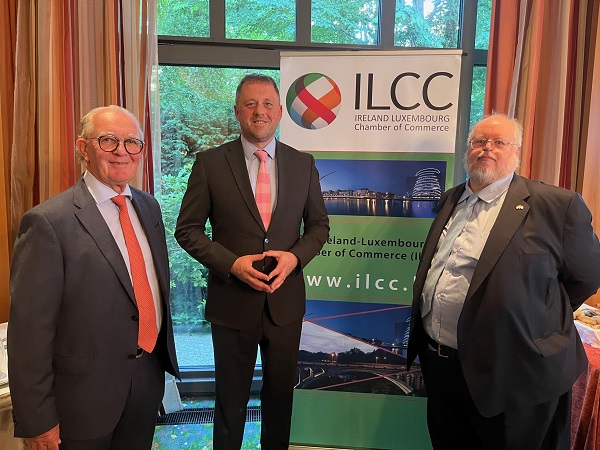 L-R: Joe Huggard, ILCC Chairman; Minister Thomas Byrne; Ambassador Stephen Dawson;
Credit: Chronicle.lu
L-R: Joe Huggard, ILCC Chairman; Minister Thomas Byrne; Ambassador Stephen Dawson;
Credit: Chronicle.lu
On Monday 20 June 2022, the Ireland Luxembourg Chamber of Commerce (ILCC) held an evening event at the Hotel Parc Belair, with guest speaker, Thomas Byrne, Ireland's Minister for European Affairs who was in the Grand Duchy for an EU ministerial meeting.
Following a meal, ILCC Chairman, Joe Huggard, gave a brief introduction in which he stated that the minister had been centrally involved in Ireland’s engagement in the Conference on the Future of Europe and, in 2021, launched the Irish Government’s strategy to increase the recruitment of Irish people to the European institutions. He added that these are difficult times, citing inflation, the previous day's election results in France and indirectly referring to the war in Ukraine.
Minister Byrne addressed the 20-strong group of ILCC members on the topic of "Ireland in a Europe Fraught with Uncertainty", giving a perspective on Ireland’s interests and concerns across a range of EU issues.
He thanked the chamber for inviting him to speak, as well as for being in existence as this contributes to Ireland's "soft power" worldwide, with its diaspora being spread far and wide.
He explained that his responsibility includes attending and contributing to the General Affairs Council of the EU, which the future of the EU, Brexit and other issues: he described his position as having a birds-eye view on what is happening in the EU.
He referred to the war in Ukraine and mentioned that Ireland has changed its policy recently by taking full part in the temporary protection directive (almost 40,000 Ukrainian refugees have arrived in Ireland so far; none have gone to Britain, contrary to what some British press feared a while ago); this week he expects that Ukraine is expected to be given full candidate status to join the EU (Ireland supported this from the outset). Also, Ireland is military neutral and cannot give military support (however, Ireland is fully supporting EU initiatives in this regard).
He also recalled Ireland's very successful vaccination strategy during the COVID-19 pandemic, which included EU-centred purchasing and it also excluded obtaining vaccines from Russia and China. He referred to Ireland "accepting the science" and highlighted the number of anti-vaxxers spreading unhelpful messages on social media.
On Brexit, he stated that the concept of a country like the United Kingdom (UK) reneging on international obligations, he stated that Britain must be held accountable; he also stated that the Northern Ireland Protocol must be protected; overall, it provided huge economic benefits to Northern Ireland.
He concluded by admitting that language skills in Ireland are "pretty poor" and maybe this is something that the country could learn from Luxembourg.
He then took a number of questions from those attending, including about homelessness and accommodation given to Ukrainian refugees: Minister Byrne explained that the types of accommodation are different, but admitted that there is a significant challenge. He reported that Ireland has provided around 12,000 social houses in the past year, the highest annual figure. He also referenced the steep increases in housing materials and highlighted that rental prices are far too high; he also mentioned recent decisions to dissuade institutional investors in apartment complexes. On sovereignty, he argued why Ireland has a greater sovereignty by being within the EU. On transport, one question referred to Ireland being highly dependent on a small number of ferry operators (for sea transport) and airlines (for air travel): he responded that there has been a massive increase in ferry routes to France, Belgium, the Netherlands, Spain and Portugal which have happened since Brexit, and confirmed that the Department of Transport is keeping an eye on this, confirming that he advocated for state investment, also mentioning that companies like Amazon and Lidl have significant volumes of goods being shipped on these routes. On Ireland joining NATO, he doubts if Ireland will as there is little public sentiment and government sentiment for this; he did acknowledge that Ireland does indeed rely on British defence forces although it has not been presented to the public like this. On investment, he stated that Ireland needs to focus on funding Ireland's defence forces for Ireland. On more Irish working at the EU institutions, he said that Ireland supports the nationality-based competitions; he also advocated for language learning and mentioned a number of initiatives being promoted in this regard.








